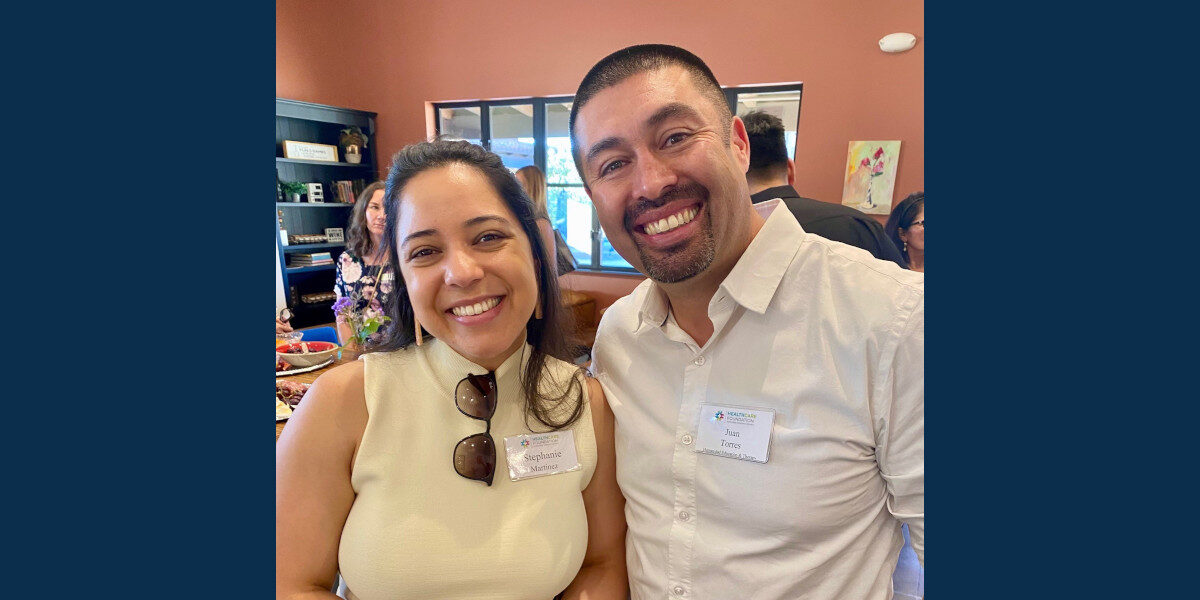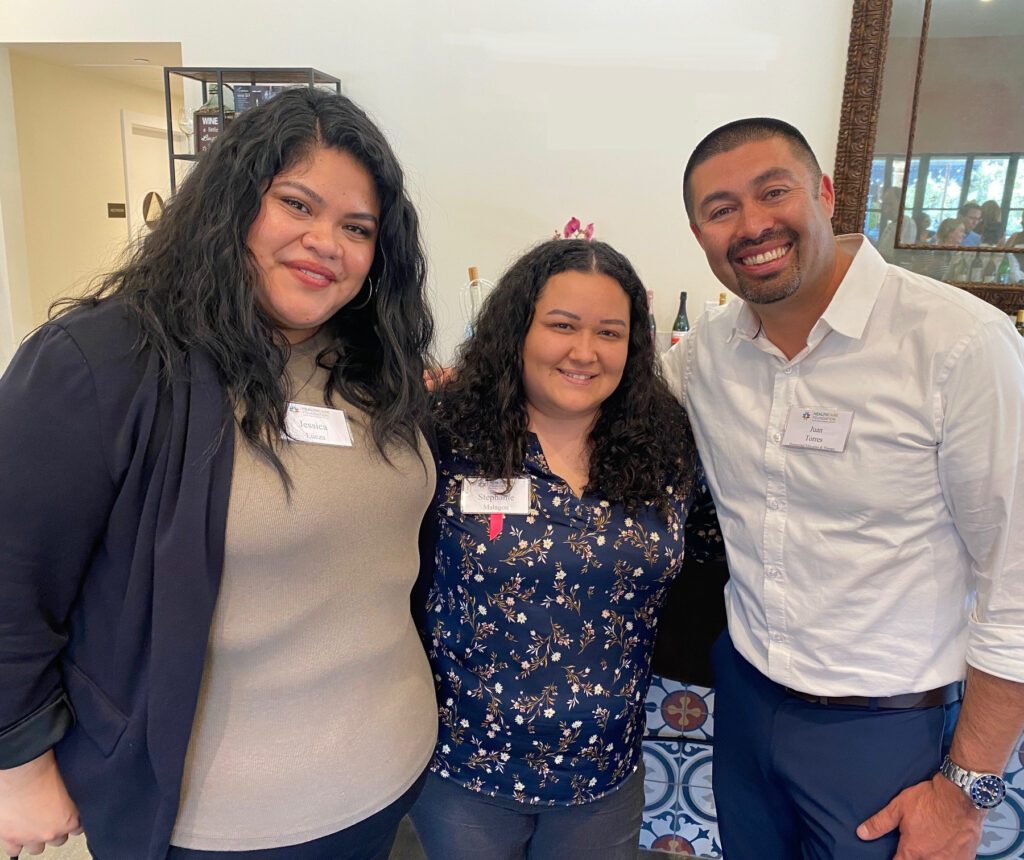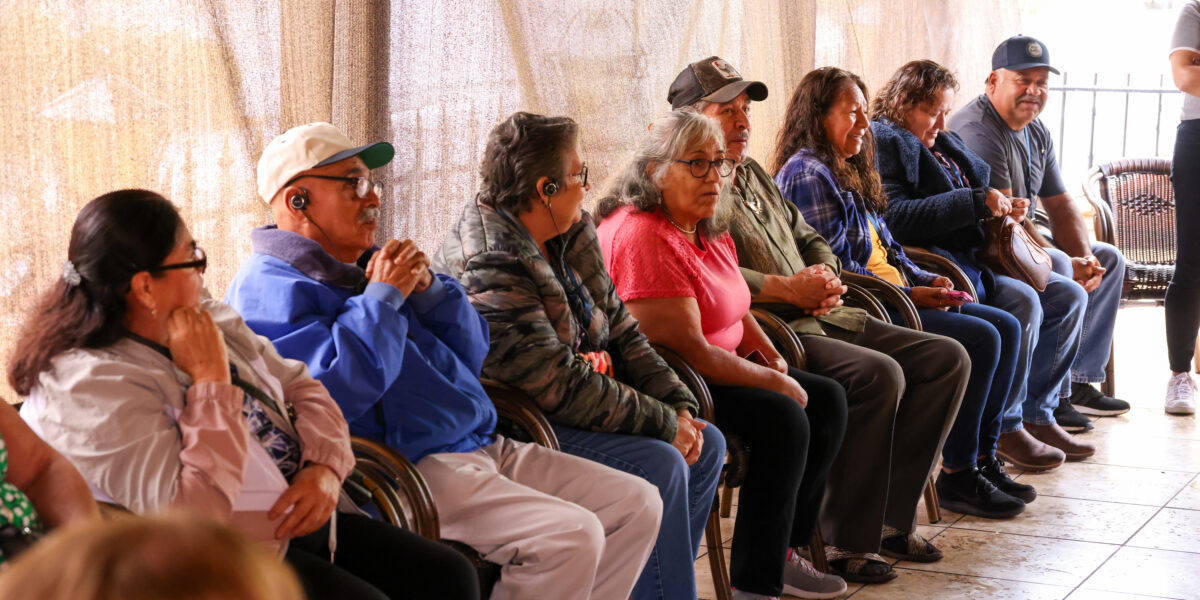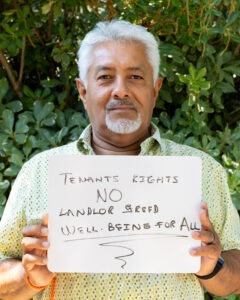

Update on the new Bicultural Clinical Training Program: A conversation with Juan Torres
5 min read. Photo: Stephanie Martinez, Program Manager at the Peter E. Haas Jr. Family Fund, and Juan Torres, Executive Director of Humanidad Therapy and Education
In 2023, the Healthcare Foundation secured a major grant from Kaiser Permanente to launch a Bicultural Clinical Training Program designed to strengthen the local pipeline of bilingual, bicultural mental health practitioners while increasing direct mental health services in areas of northern Sonoma County where residents have the greatest challenges to accessing such care.
A collaboration with Humanidad Therapy & Education Services and On the Margins, the Bicultural Clinical Training Program, which launched in August 2023, includes two novel components. The first, which the grant covers for two years, allows Humanidad to bring its services to Cloverdale residents through two paid traineeships per year. Additionally, these traineeships feature professional supervision by a bilingual, bicultural Clinical Supervisor—a rare opportunity designed to deepen the culturally responsive nature of the education and practice of the bilingual graduate student trainees.
The second component of the Program (additionally supported by a grant from the Peter E. Haas Jr. Family Fund) is a culturally responsive online curriculum called Nepantlah. Developed by On the Margins, this bilingual workshop series is designed for mental health practitioners, including trainees like those in the Humanidad component described above, serving bicultural and/or Spanish-speaking clients in northern Sonoma County, or even around the state and country. (Note: The outcomes of this one-year pilot program will be covered in a later article.)
As Humanidad nears the halfway point in its two-year effort in Cloverdale, we spoke with its executive director, Juan Torres, about the impact of the initiative and its importance as a model for the equitable delivery of mental health services in our region.
What is the most significant outcome of the program so far?
The most important thing for Humanidad is that we were able to open an office in Cloverdale and reach a population we otherwise would not be able to, at least not in person. There’s a huge need in north county, in particular with farmworkers and their families. But it takes about 45 minutes to an hour to drive from Santa Rosa [where Humanidad is based] all the way to Cloverdale or vice versa.
Can you say more about the people Humanidad is serving in Cloverdale?
Coming to Cloverdale we were reminded that the Latinx community is a young community, and many of the program’s participants are young individuals or young parents looking for assistance. Life is not easy sometimes. As immigrants, first- or second-generation, they are struggling in common but also unique ways with the stressors of life here. It can be hard to find someone that you identify with and to whom you can open up and trust to share your challenges with. Building trust is often the hardest thing for anyone to do. It’s a huge accomplishment for Humanidad and the team that we were able to build that trust, with our clients and with the community there in Cloverdale.
“For many individuals in our community, therapy is something new for them. It takes a lot of guts to open up to someone else. What we found is that it took time for a lot of our clients to communicate the full scope of their challenges.”
Juan Torres, Humanidad Therapy and Education
What is the most significant outcome of the program so far?
The most important thing for Humanidad is that we were able to open an office in Cloverdale and reach a population we otherwise would not be able to, at least not in person. There’s a huge need in north county, in particular with farmworkers and their families. But it takes about 45 minutes to an hour to drive from Santa Rosa [where Humanidad is based] all the way to Cloverdale or vice versa.
Can you say more about the people Humanidad is serving in Cloverdale?
Coming to Cloverdale we were reminded that the Latinx community is a young community, and many of the program’s participants are young individuals or young parents looking for assistance. Life is not easy sometimes. As immigrants, first- or second-generation, they are struggling in common but also unique ways with the stressors of life here. It can be hard to find someone that you identify with and to whom you can open up and trust to share your challenges with. Building trust is often the hardest thing for anyone to do. It’s a huge accomplishment for Humanidad and the team that we were able to build that trust, with our clients and with the community there in Cloverdale.
Were there challenges in building that trust?
It’s naturally been a process. But what has really helped has been working very closely with local agencies like La Familia Sana, Corazón Healdsburg, the Healdsburg Unified School District, SOS, and the Senior Center just down the street, to build those relationships, build that trust. Actually having an office there in Cloverdale has helped us get that buy-in, that understanding from the local partners, who realized that they could even walk their clients over to Humanidad’s office and introduce them to the staff members there in person. It makes a big difference. So being on-site in Cloverdale and well connected with the other agencies in the area have really set us up for success as we move into the second year.
Will there be any modifications in the second year?
We intend to keep building on that trust and cooperation. In particular, we plan to increase our participation and our presence with Corazón Healdsburg. Many of their clients, even if they don’t necessarily live in Cloverdale, live in the surrounding area. Corazón Healdsburg had provided mental health services in the past so they were very interested in partnering with us. It was a win-win situation. For example, Corazón works really closely with the school district to support the students. But often, while the kids might get support, the parents don’t. So we’re having conversations now about how, in addition to the one-on-one therapy, we can hold educational workshops or group therapy for some of the parents who are really seeking that assistance, and who want to be better parents. Sometimes we see the challenges but we don’t know how to overcome them and we need help. There are lots of parents that are looking for that help.
How has the experience been for the graduate student trainees?

The trainees are grateful for the opportunity to be working with their community. And they’re grateful to have a clinical supervisor that has that lived experience as a first-generation immigrant—the cultural core-competency that often is lacking in other traineeship programs. It’s really unique.
In addition, they have been able to participate in the workshops put on by Nepantlah, which has allowed them to have deeper conversations around our cultura. One important learning that came out of those workshops, which we now often refer to, is the encouragement to feel comfortable speaking Spanglish to our clients. Some of our clients, particularly younger individuals, can feel like their English is not perfect and their Spanish is not perfect either, so sometimes Spanglish is what comes out.
As part of the program, the trainees in Cloverdale also get to participate in group supervision with six other clinicians in our offices. These might be trainees themselves, though most of them are associates, more seasoned therapists, and a few of them are about to be licensed. With two clinical supervisors leading the conversation, they share their challenges and lived experience, offer suggestions, and bounce ideas off of each other. That’s something pretty unique about Humanidad as well, having a whole room of bilingual/bicultural therapists supporting each other as part of the learning process, identifying the best options and care for their clients.
How have the clients responded to these services being available?
For many individuals in our community, therapy is something new for them. It takes a lot of guts to open up to someone else. What we found is that it took time for a lot of our clients to communicate the full scope of their challenges. As a result, many were initially thought to be lighter acuity—meaning they just needed a little bit of support—but as our therapists started working with them and won their trust, we realized that their need was significantly higher. In those cases, instead of providing the standard 12 sessions, we were able to extend their services and provide up to 24 sessions, in order to more fully address the trauma that they were carrying.
How unusual is it to receive more sessions if needed?
Actually, the standard is usually eight sessions. It is always a challenge, too, since that is often the point at which the individual is just starting to open up to the therapist. So from the start we decided to offer 12 sessions, so that we have the opportunity to build trust and open up a dialogue that can allow us to really begin to address some of the client’s needs and challenges. But, as I say, we found that in many cases 12 sessions were really not adequate. Fortunately, we had the flexibility to increase that number when it was deemed clinically important to do so.
What has been the importance of offering bilingual and bicultural services?
In addition to the language barrier that’s otherwise there, there’s a lot of trauma that only an immigrant could really understand. At the same time, that trauma gets transferred to the next generation. Many youth face difficulty or challenge in identifying themselves. They can feel like they don’t belong or are not fully accepted here, yet they don’t fully identify with their parents or their home country. Many of us who are immigrants or grew up here and are first-generation individuals, we understand that internal conflict. It’s easier to have those conversations.

Are there other opportunities this funding has allowed for?
Yes! As part of this partnership, we were able to bring in the trainees as full employees at 20 hours a week with full benefits, including paid sick time and paid vacation time. This is huge. As far as I know, we’re the only agency that’s bringing in trainees with full benefits. In many cases trainees are not paid or just get a small stipend. But a bilingual, bicultural individual, you know—they’re unicorns! We knew it was vital to help bilingual/bicultural graduate students build a viable career right here in north county, and that included compensating them as valuable employees. If I could, I’d hire them for 40 hours a week.
At the same time, the services the trainees are providing Cloverdale residents remain free, correct?
Correct, everything is 100% free. And the goal is for these trainees to transition now to associates. Once they graduate they become associates. At that stage, they’ll have the ability, under the clinical supervisor, to take in Medi-Cal referrals. So we want to support them as trainees but also continue their growth as associates, increasing the capacity of bilingual/bicultural mental health services in northern Sonoma County and across the whole county.
The goal is to increase the capacity. Prior to this initiative, we were only able to bring in two trainees per year. Now, in addition to our two normal trainees, we were able to bring in Jessica and Stephanie this year. Last year we had three therapists get licensed and this year we expect three other therapists to be licensed. From trainees, to associates, and now they’re becoming licensed therapists. It feels good. It feels like a true accomplishment.

Related News + Stories
Invest in Our Community
Your support is vital to our collective vision of eliminating health inequities in northern Sonoma County.
Donate



